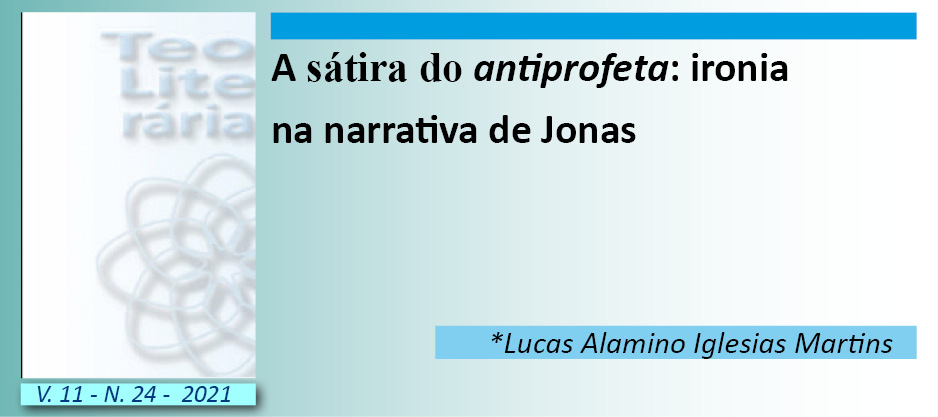A sátira do antiprofeta:
ironia na narrativa de Jonas
DOI:
https://doi.org/10.23925/2236-9937.2021v24p549-582Palavras-chave:
Jonas, ironia, sátiraResumo
O livro de Jonas tem sido amplamente conhecido como uma obra prima literária. Nas últimas décadas, estudiosos tem explorado os recursos narrativos do livro como um todo enfatizando sua relação entre forma e conteúdo. Contudo, dentre essas análises literárias, poucas exploram um fenômeno chave para se compreender o livro: a presença de ironia. No livro de Jonas, a ironia é central para revelar os múltiplos fatores de interconexão entre as diversas partes do livro. Essencial para a caracterização, a ironia joga com as expectativas do leitor; todos os personagens atuam de forma oposta à esperada. A ironia também aparece relacionada ao ponto de vista; o narrador a explora através das palavras inseridas na boca dos personagens. Finalmente, há ironia na maneira como essas palavras ecoam outros textos do cânon; o discurso do rei de Nínive, por exemplo, reproduz as palavras de Moisés em Êx. 32 e 34. Por meio da crítica narrativa, este artigo tem o objetivo de explorar como a ironia opera no livro tornando-o a sátira de um antiprofeta.
Referências
ACKERMAN, J. S. “Jonah”. In: ALTER, R.; KERMODE, F. (Eds.). The Literary Guide to the Bible. Cambridge: Harvard University Press, 1987. p. 234-244.
BERLIN, A. “A Rejoinder to John A. Miles, Jr., with Some Observations on the Nature of Prophecy”. The Jewish Quarterly Review. New Series, v. 66, n. 4, p. 227-235, April 1976.
BRUEGGEMANN, W. The Prophetic Imagination. Minneapolis: Fortress Press, 2001.
CHISHOLM Jr., R. B. Handbook on the Prophets. Grand Rapids: Baker Academic, 2002.
CRAIG, K. M. A Poetics of Jonah: art in the service of ideology. Atlanta: Mercer University Press, 1993.
DAVIDSON, S. V. “Postcolonial Readings of the Prophets”. In: SHARP C. J. (Ed.). The Oxford Handbook of the Prophets. New York: Oxford University Press, 2016. p. 507-527.
DAVIS, E. F. Biblical Prophecy: perspectives for Christian theology, discipleship, and ministry. Louisville: Westminster John Knox Press, 2014. (Interpretation).
FRETHEIM, T. E. The Message of Jonah: a theological commentary. Minneapolis: Augsburg Fortress Pub., 1977.
FRYE, N. Anatomia da Crítica: quatro ensaios. São Paulo: Realizações, 2014.
GOOD, E. M. Irony in the Old Testament. Sheffield: The Almond Press, 1981.
GUNN, D. M.; FEWELL, D. N. Narrative in the Hebrew Bible. Oxford: Oxford University Press, 1993.
HOLBERT, J. C. “‘Deliverance belongs to Yahweh!’: satire in the book of Jonah”. Journal for the Study of the Old Testament, 21, p. 59-81, October 1981.
JEMIELITY, T. Satire and the Hebrew Prophets. Louisville: Westminster John Knox Press, 1992. (Literary Currents in Biblical Interpretation).
KÖEHLER, L. et al. The Hebrew and Aramaic Lexicon of the Old Testament. Leiden: E. J. Brill, 1994-2000. Electronic edition.
MAGONET, J. Form and Meaning: studies in literary techniques in the book of Jonah. Sheffield: The Almond Press, 1983.
MARCUS, D. From Balaam to Jonah: anti-prophetic satire in the Hebrew Bible. Atlanta: Scholars Press, 1995. (Brown Judaic Studies, 301).
MILES Jr., J. A. “Laughing at the Bible: Jonah as parody”. In: The Jewish Quarterly Review. New Series, v. 65, n. 3, p. 168-181, January 1975.
MUECKE, D. C. The Compass of Irony. London: Methuen, 1969.
RYU, C. J. “Divine Rhetoric and Prophetic Silence in the book of Jonah”. In: FEWELL, D. N. (Ed.). The Oxford Handbook of Biblical Narrative. New York: Oxford University Press, 2016. p. 226-236.
SHARP, C. J. Irony and Meaning in the Hebrew Bible. Bloomington; Indianapolis: Indiana University Press, 2009.
SIMON, U. The JPS Bible Commentary: Jonah. Philadelphia: The Jewish Publication Society, 1999.
STERNBERG, M. The poetics of the Biblical Narrative: ideological literature and the drama of reading. Bloomington: Indiana University Press, 1987.
STUART, D. Word Biblical Commentary: Hosea-Jonah. Dallas: Word, Incorporated, 2002. v. 31.
SWEENEY, M. A. The Twelve Prophets. Collegeville: The Liturgical Press, 2000. (Berit Olam Series, 1).
TRIBLE, P. Rhetorical Criticism: context, method and the book of Jonah. Minneapolis: Fortress Press, 1994. (Guides to Biblical Scholarship).

Publicado
Como Citar
Edição
Seção
Licença
Copyright (c) 2021 TEOLITERARIA - Revista de Literaturas e Teologias

Este trabalho está licenciado sob uma licença Creative Commons Attribution 4.0 International License.
A TeoLiterária – Revista de Literaturas e Teologias é detentora dos direitos autorais de todos os artigos publicados por ela. A reprodução total dos textos em outras publicações, ou para qualquer outro fim, por quaisquer meios, requer autorização por escrito do editor. Reproduções parciais de artigos (resumo, abstract, mais de 500 palavras de texto, tabelas, figuras e outras ilustrações) deverão ter permissão por escrito do editor e dos autores.


